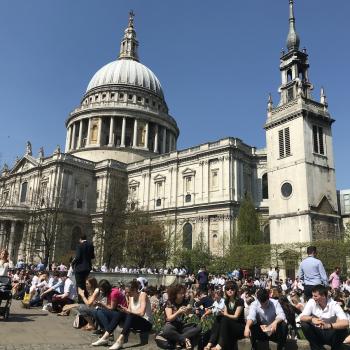 Often, when I hear a biblical word used out of context with modern, cultural meaning attached to it, I think to myself, in the words of Inigo Montoya from “The Princess Bride,” “I do not think that word means what you think it means.”
Often, when I hear a biblical word used out of context with modern, cultural meaning attached to it, I think to myself, in the words of Inigo Montoya from “The Princess Bride,” “I do not think that word means what you think it means.”
One such word is hope, which today is used much like the word “wish,” as if there is something that we would like to see happen, but we really don’t know if it will.
In faith-sharing conversations, I will sometimes ask something like “if you were to die today, do you know if you would go to Heaven?” The response is often, “I hope so.” Then I am able to explain that that there is a way to KNOW so, to be certain – it’s not a mere wish to be granted by a cosmic genie in a bottle.
Biblically speaking, hope is certainty. Different words are used for hope throughout both the Old and New Testaments. The Hebrew word yachal is used 48 times in the Old Testament, and in context, it represents expectancy or waiting on God, who we know will deliver. The second Hebrew word used in the Old Testament for hope is tiqvah, which literally means tension, as in a cord being stretched. This once again conveys the sense that something is inevitable. It may not happen in the time frame that we expect, but God WILL do it.
In the New Testament, the Greek word elpis is used, which, according to Strong’s Concordance, means expectation, trust, and confidence. The understanding is that what is expected is guaranteed. One of the verses usually quoted as an example of this kind of hope is Hebrews 6:19, which states “We have this hope as an anchor for the soul, firm and secure.” This imagery conveys the solid and trustworthy nature of Christian hope. It is indeed certainty.
Another example of the use of the word hope in the modern context is in youth sports. A young person trying out for the baseball or football team might say “I hope I make it.” But with some action and commitment on their part – by practicing really hard and being consistent – the young person can have more confidence in making the team.
For the believer, that action is placing our faith in Christ. Once we choose to follow Him, we have certainty. Another favorite Scripture reference to hope for many Christians is Hebrews 11:1: “Faith is the substance of things hoped for, the evidence of things not seen.” I love that word substance being used for our hope – it conveys the solid nature of the reality of our certainty.
Being able to make that decision often comes as a response of studying God’s Word, which in the Old Testament, especially, we see tied to the use of the word hope. Not only do we have hope in God, we have hope in His Word. Psalm 119:114 is a great and well-known example of this use: “You are my refuge and my shield; I have put my hope in your word.”
That is why I believe it is so important to get God’s Word into people’s hands and hearts. Even in the midst of war and suffering and trials, individuals can find the hope that is an anchor for their souls in the Bible. At EEM, the ministry that I work with in Eastern Europe, we have many friends in Ukraine, especially, who have expressed how much they value their Bibles right now. They explain that nothing else can give them the hope they need to keep going – something solid and real to cling to beyond this world’s shifting sands.
So when trouble comes, we look for what’s real, something to hang onto, and this is what biblical hope is – not some ephemeral fantasy. Because our hope rests in God and His Word, it brings peace. We are not promised comfort, wealth or lack of trouble – those are definitely things we might wish for. But in hope and the certainty we are guaranteed through Jesus’ death, burial and resurrection, we have something so much greater to look forward to throughout eternity. Let’s be about the business of sharing that hope with others – especially as the times in which we live seem more uncertain than ever.

















